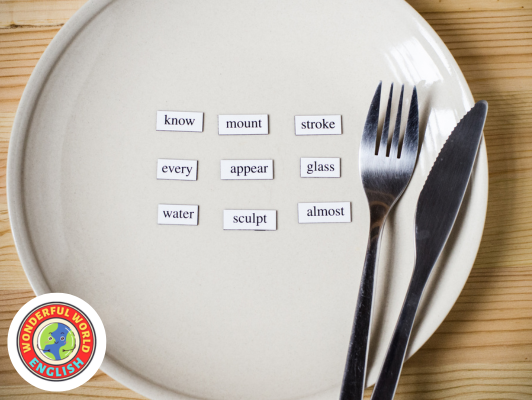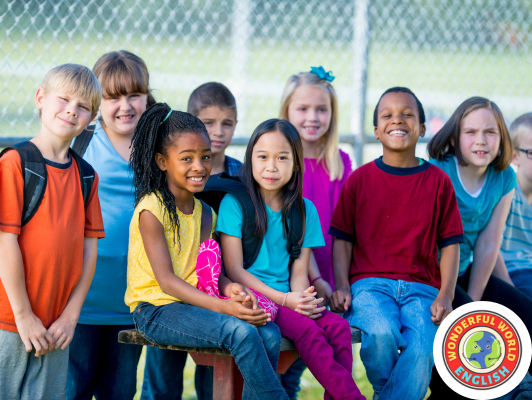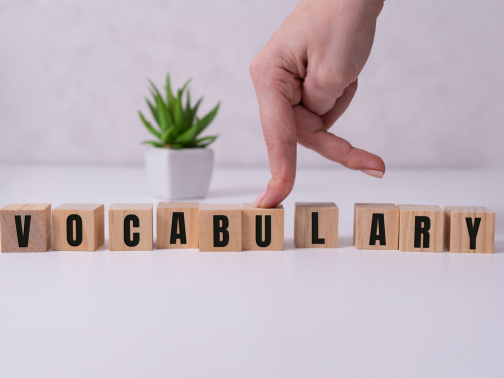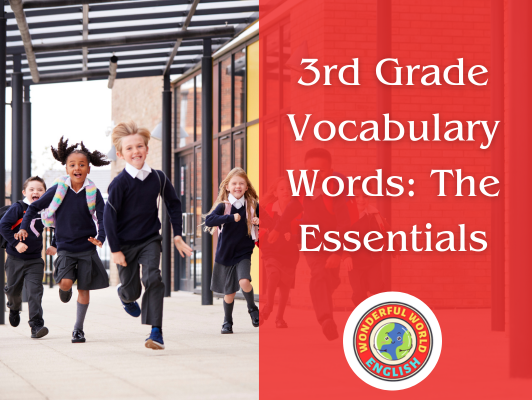Contents
Toggle
Meet David De’ Ath, founder, editor, and writer at Wonderful World English. With his extensive background as an English teacher, David provides valuable insights and practical tips on ESL for students and teachers alike.
Expanding a child’s vocabulary is a critical aspect of their language arts education, especially during the formative years of elementary school.
In third grade, students encounter a variety of new and challenging words that are vital to their reading comprehension and written expression.
This stage marks a shift from learning to read to reading to learn, where a robust vocabulary becomes indispensable as students begin to tackle more complex texts and concepts.
A well-developed vocabulary not only enhances reading and writing skills but also boosts confidence in communication.
It allows third graders to better grasp the nuances of language, providing them with a toolset to clearly articulate their thoughts and ideas.
Moreover, it sets the foundation for lifelong learning and academic success.
With a focus on language acquisition, students are encouraged to engage with vocabulary exercises, including the use of worksheets, read-aloud books, and interactive activities that provide a multi-faceted approach to word mastery.
Key Takeaways
- Vocabulary growth is crucial for third graders transitioning from learning to read to reading to learn.
- A strong vocabulary supports reading comprehension, written expression, and effective communication.
- Multi-faceted learning tools and exercises help students master essential third-grade vocabulary words.
Understanding Vocabulary Essentials
Mastering vocabulary is critical to academic achievement, especially in the third grade where comprehension and fluency take significant steps forward.
This section breaks down the essentials of vocabulary building, integration within language arts, and effective learning techniques to enhance students’ mastery of new words.
Vocabulary Development
Vocabulary development in third graders involves both the acquisition of new words and the deep understanding of their usage.
They learn new words more effectively through multiple exposures in various contexts, from reading to everyday conversations.
Students must absorb the nuances of each word, including its spelling, meaning, and application.
For instance, one approach to enriching a student’s vocabulary is to provide a list of words weekly, each carefully chosen for its relevance to current events or classroom topics.
- Examples of Vocabulary Words
- Ability
- Absorb
- Accuse
Language Arts Integration
Integrating vocabulary into the language arts curriculum ensures sustained engagement with new words.
Whether through writing assignments, readings, or oral activities within language arts, students have the opportunity to spell and use the words actively.
This integration also aligns with the purpose of vocabulary study, which is not just to memorize words but also to enrich communication skills across all areas of study.
- Methods of Integration
- Spelling bees
- Story creation with vocabulary words
- Vocabulary games
Key Vocabulary Learning Techniques
Effective learning techniques for vocabulary help students remember and spell words long-term.
One technique includes associating words with images or experiences, making them easier to recall.
Active usage of words in sentences and stories also reinforces their meanings and proper spelling.
In addition, teaching students about root words, prefixes, and suffixes expands their capacity to decode unfamiliar vocabulary.
- Techniques to Enhance Learning
- Visual aids (e.g., flashcards with images)
- Word association games
- Morphology study (root words, prefixes, suffixes)

Essential 3rd Grade Vocabulary Words
In third grade, students expand their vocabulary with a range of new and more complex words.
They learn to use these words in various contexts, enhancing their reading comprehension and writing skills.
List of Fundamental Words
- Actual: represents things as they are in reality
- Brilliant: shining brightly; exceptionally clever or talented
- Clever: quick to understand, learn, and devise or apply ideas
- Effect: a change that is a result or consequence of an action or other cause
- Intelligent: having or showing the ability to easily learn or understand things
- Magnificent: impressively beautiful, elaborate, or extravagant
- Opposite: as different as possible
- Rare: not common or frequent; unusual
Third graders are expected to be familiar with these words and many others that they will encounter in their studies.
Understanding Word Meanings
It is crucial for students to recognize words, understand their meanings, and understand how they relate to other words.
For example, they should know that “cause” leads to an “effect,” and that every effect is the result of an actual cause.
Understanding the meaning of words like “opposite” helps them comprehend contrasts and antonyms in texts they read and write about.
Spelling and Usage
Effective communication in writing hinges on correct spelling and proper usage of vocabulary.
Students learn to spell complex words like magnificent and intelligent, and how these words can enhance their writing to make it more descriptive and engaging.
Third graders practice using these words in sentences to become more proficient in their usage and more confident in their communication skills.
| absorb | active | actual | address | advantage |
|---|---|---|---|---|
| agreeable | allowed/aloud | amazing | ambulance | antlers |
| avoid | badge | baggage | balance | balcony |
| banquet | bison | bleak | blood vessels | blotch |
| brain | brief | brilliant | cable | camouflage |
| careless | carnival | cashier | caterpillar | cathedral |
| cellar | certain | chipmunk | clever | climate |
| close/clothes | coast | cocoon | complete | consider |
| contain | crumple | cube | custodian | cylinder |
| decay | decimals | deed | defend | denominator |
| describe | details | device | diagram | digestion |
| disappointed | disease | dusk | earlier | earlobe |
| easel | eaten | echo | effort | elegant |
| endangered | erosion | evaporation | event | examine |
| excuse | explore | fierce | fossil | foul/fowl |
| fright | gadget | gallery | garden | gasp |
| gecko | glacier | glee | grace | gradual |
| grasp | habit | harsh | heard/herd | helicopter |
| hinge | imitate | instant | intestines | invitation |
| irritate | jellyfish | journey | kazoo | kidneys |
| knight | lamppost | landmark | launch | loyal |
| magician | magnificent | main/mane | marsh | measurement |
| method | mineral | moisture | mural | muscles |
| nectar | neighbor | nerves | numerator | nurse |
| nursery | observe | opposite | organ | oxen |
| pair/pear | paws/pause | peace/piece | peer/pier | perform |
| pianist | positive | predator | prevent | prey |
| primary | prism | process | pyramid | quality |
| quarrel | quotient | rare | recall | rely |
| repair | respect | responsible | rhinoceros | ridiculous |
| schedule | scientist | security guard | similar | skull |
| skyscraper | slumber | solution | spacecraft | sphere |
| spinal cord | squirrel | stair/stare | struggle | submarine |
| suitable | survey | symbol | tackle | threw/through |
| throne/thrown | tissue | tourist | tournament | tractor |
| triumph | typical | uncertain | unfasten | unite |
| unusual | urge | valuable | vanish | vast |
| vehicle | vertebrae | vessel | vision | volunteer |
| wagon | wander | wisdom | wit | yardstick |
| yield | yolk | yummiest | zinnia | zookeeper |
Tools for Enhancing Vocabulary
Effective vocabulary acquisition for third graders involves a blend of strategies that cater to diverse learning styles.
Tools such as worksheets, interactive methods, and assessment techniques are critical for reinforcing understanding and retention.
Worksheets and Printables
Worksheets serve as a staple resource for educators to arrange targeted vocabulary practice.
They often combine multiple tasks like matching definitions, filling in blanks, and using the words in sentences to aid recall.
Printables from reputable educational platforms can be integrated into lesson plans, enabling students to repeatedly examine and process new words.
A particularly useful collection of these resources can be found on Flocabulary, which offers a systematic approach to vocabulary development.
Interactive Learning Methods
Interactive learning involves dynamic activities that avoid traditional rote memorization techniques.
Tools such as digital games and collaborative exercises encourage students to actively practice and use new vocabulary in a variety of contexts.
They can predict word meaning through online content units or observe the use of vocabulary in interactive stories.
For example, ThingLink allows students to create interactive images, enriching their understanding of vocabulary through visual connections.
Assessment Techniques
Assessment techniques should not only test vocabulary knowledge but also reinforce it.
Quick quizzes and oral reviews give immediate feedback, while cumulative tests help to evaluate long-term retention.
Some tools offer innovative ways to examine vocabulary acquisition, such as having students illustrate word meanings or use terms in original stories, which encourages deeper processing and recall.
For some top suggestions to boost vocabulary in the classroom while having fun, check out the link below!
Related: Fun Vocabulary Activities: 10 Ways to Boost Word Skills

Applying Vocabulary in Context
Applying vocabulary in context is crucial for 3rd graders as it enhances their ability to understand and use words effectively.
This application supports reading comprehension, creative expression, and daily communication.
Language in Everyday Life
He observes his surroundings, makes connections, and applies new terms in various scenarios.
For example, a child may examine a diagram in science class, then use the learned vocabulary to describe the water cycle in conversation.
Consistently performing this act fosters linguistic wisdom and strengthens his grasp of language.
Creative Writing and Vocabulary
She explores word meanings through storytelling, which allows individual creativity to flourish.
By integrating newly learned words, a third grader can craft stories with wit and vision, conveying more complex ideas.
Creative writing assignments serve as a journey through which students deepen their understanding and expand their expressive capabilities.
Reading Comprehension
They encounter passages that introduce sophisticated concepts.
Third graders are encouraged to explore context clues within a passage to infer the meaning of challenging words.
Understanding how vocabulary relates to the text leads to brief yet significant moments of literary enlightenment, enhancing their overall reading experience.

Additional Vocabulary Resources
When exploring resources to enhance a 3rd grader’s vocabulary, one can consider a multitude of platforms that provide structured techniques and methods.
Flocabulary offers an engaging solution for learning new words through music and creative videos.
Their 3rd Grade Vocabulary list is printable and part of a comprehensive vocabulary development program.
For educators searching for more traditional methods, K5 Learning is a resourceful website that features Grade 3 Vocabulary Worksheets.
These worksheets are free and cover a range of skills from meanings of words to context clues and synonyms/antonyms.
| Resource | Technique | Process |
|---|---|---|
| Flocabulary | Music & Video | Printable lists, systematic program |
| K5 Learning | Worksheets | Self-paced learning, diverse exercises |
Spelling Words Well provides a compilation of 200 vocabulary words that educators and parents can integrate into daily conversations or instructional activities.
This guide helps to steadily increase a child’s vocabulary.
Games like Vocabulary Checkers or Bingo make the learning process interactive and enjoyable, signaling to students that language acquisition can be fun.
Finally, Education.com stands as a primary resource with a wide variety of activities to build vocabulary.
These activities emphasize grammar rules through synonyms, antonyms, and homophones, among others.
Vocabulary parades are excellent opportunities to get students involved in the learning process while having fun.
For a complete guide on how you can give your students a day to remember while improving their vocabulary skills, check out the link below!
Related: Ideas for Vocabulary Parade: Ultimate Guide

Conclusion
Building a robust vocabulary is crucial for third graders as it lays the foundation for their future academic success.
The ability to understand and use a wide range of words greatly contributes to a child’s ability to comprehend texts and communicate effectively.
Through daily experience with language, children can develop and grow their vocabulary, which, in turn, enhances overall literacy.
Educators and parents can help students learn new words by integrating vocabulary into everyday learning.
Exposure to vocabulary words for 3rd graders is beneficial for immediate learning goals and also prepares students for more complex language skills in subsequent grades.
It is important for children to reflect on their vocabulary knowledge, understanding the significance of each new word within various contexts.
Third graders are at a stage where interactive activities, engaging reading material, and structured word studies allow for vocabulary development in an organic and enjoyable manner.
Encouraging third graders to be curious about words can:
- Expand their ability to express thoughts and emotions.
- Enhance reading comprehension.
- Empower them to master content across different subjects.
As students conclude their third-grade year, having a diverse vocabulary will serve as a powerful tool that supports their ongoing journey toward becoming proficient readers and confident communicators.
We hope you find value in this information; you can contact us if you require any support.
Have a wonderful day!
Image Attribution: All images licensed via canva.com





